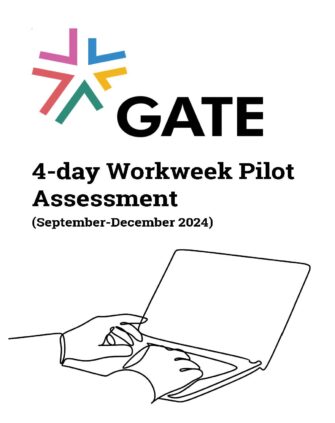Background & Summary
Seeking to enhance well-being and boost productivity while maintaining work standards, GATE introduced a 4-day workweek pilot in September. Staff changed their working hours to Monday to Thursday, with Fridays off, with the aim not to condense work but rather reduce the number of days and hours that staff work overall. One exception to the 4-day workweek rule was made, with staff required to work any relevant days when traveling to/from and attending conferences.
Surveys with staff were conducted at the start, midpoint and end of the pilot, concluding with overall positive feedback. Staff expressed satisfaction, noting an improved work-life balance and greater productivity, motivation and focus.
Potential Concerns
One main concern was the reaction of peer organizations and partners. This included the fear that partner organizations, especially those with fewer resources (e.g., budget or staff), might judge GATE for such a policy. However, GATE staff reported that organizations and partners have been very supportive. Another concern was in relation to coordination with external organizations and partners. However, staff reported that the condensed workweek did not impact these relationships negatively, and collaboration was still possible.
Success Modeling
GATE’s 4-day workweek pilot has created a ripple effect, encouraging some other organizations to wonder if they should pilot a similar initiative. It’s worth noting several factors that likely contributed to the success of this pilot:
- All the staff, including leadership, bought in;
- GATE is a relatively small organization;
- No staff had performance issues;
- Although GATE has a hard-working and high-productivity culture, its leadership has consistently stressed work-life balance.
Furthermore, staff noted that it was meaningful and inspiring that leadership clearly cares so much about their well-being and prioritizes it with concrete, tangible actions, with staff reporting that this policy signaled a deep dedication and care for the staff as human beings.
Achievements and importance
Staff say that they have become:
masters at time management and much more focused.
Given the prevalence of burnout in the non-profit sector, especially in those organizations working with marginalized communities and human rights, this pilot showed to be innovative and future-oriented. It allows staff to center their well-being and show up with more motivation and focus at work.
I have worked across different networks and organizations, and I feel that everyone often preaches wellness and uses it as a dangling carrot. GATE has been the exception to this finding because GATE is intentional about wellness and ensuring that the team is not too overburdened.
Staff observed that the pilot proved that leadership profoundly cares about their well-being. The fact that other organizations are considering replicating this model also speaks volumes. Staff have indicated that this model can, eventually, help staff retention and avoid turnover (and associated costs).
We have enhanced our well-being without sacrificing efficiency as an organization.






